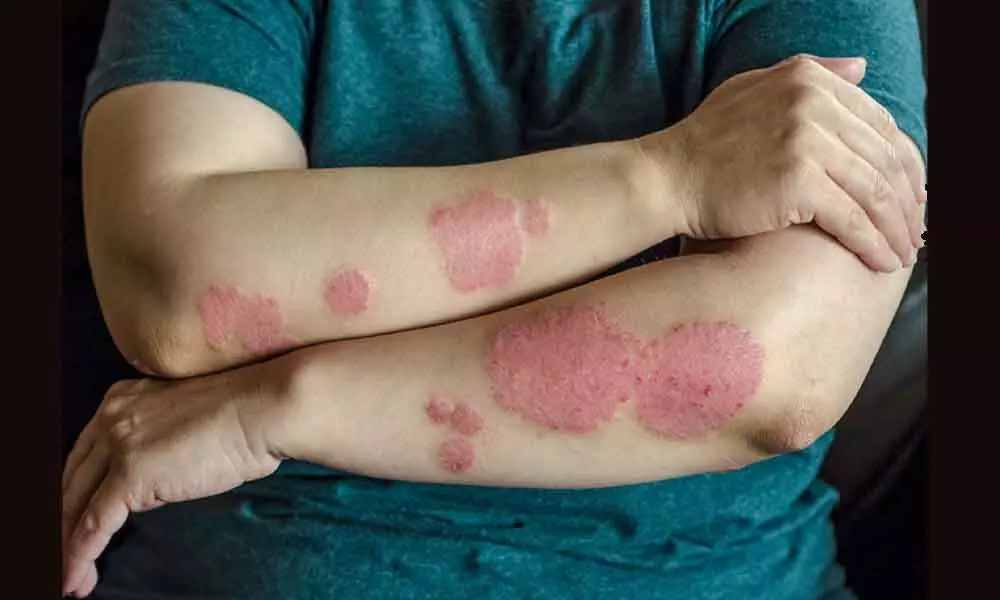Psoriasis can worsen conditions if not managed well

Representational Image
Some people believe that psoriasis is just a common cosmetic, skin problem. Many believe it is contagious, making it one of the most stigmatized of all skin conditions and cannot be managed.
Some people believe that psoriasis is just a common cosmetic, skin problem. Many believe it is contagious, making it one of the most stigmatized of all skin conditions and cannot be managed.
Psoriasis occurs when one's immune system is overactive and attacks healthy skin tissue, causing inflammation and speeding up skin cell growth. As a result, the skin becomes itchy, painful and scaly, with inflamed red plaques (patches) or silvery scales. These can appear across the body, often on the scalp, knees, back or elbows. Still, many believe these patches cannot hurt them.
Shrichand G Parasramani, Dermatologist, Anisha Clinic, Mumbai said, "Psoriasis is an autoimmune disease which can be controlled but has no cure. It can go into remission. Patients and their families have several misconceptions of the disease, such as it are infectious in nature and they have to live with it lifelong. It affects the patient's quality of life to a large extent which increases his level of stress. Many patients are drawn towards alternative medicine such as Ayurveda or homoeopathy due to the failure of conventional therapy and at times high cost of treatment. This leads to irregularity in treatment, resulting in a flare-up of the disease or treatment failure. However, patients must understand the importance of addressing the disease so as to avoid the progression of psoriasis and its underlying complications. They must be told that with newer treatment options patients can lead an almost near-normal life."
Here are ways Psoriasis can worsen if not managed:
Inflammation
Psoriasis is a chronic autoimmune disease that causes inflammation. What's especially important to note is that even mild psoriasis can be a sign of significant inflammation in the body. This inflammation, in turn, can contribute to other associated health conditions.
Given that dermatologists are the key medical experts responsible for treating psoriasis, it is important to consult one to understand the condition and suitable and advanced treatment options such as biologics.
Increased risk of health complications
People living with psoriasis are at a higher risk of developing associated conditions or comorbidities. The most common of these is psoriatic arthritis -- which affects 30 per cent of psoriasis patients. It is a chronic and inflammatory disease of the joints, resulting in stiffness, pain, throbbing, swelling and tenderness in joints. If this is not treated, long-term joint damage can result.
People with psoriasis, particularly in more severe cases, are also more likely to have other inflammatory conditions, including heart attack, stroke, type-2 diabetes, and inflammatory bowel disease. Other related health issues can also include obesity, chronic obstructive pulmonary disease, metabolic syndrome, hypertension, kidney or liver disease uveitis, and sleep apnea.
Treatment to prevent flare-ups
If unmanaged, psoriasis can lead to plaques and scales that continue to build and spread. Over time, these can become quite painful, causing severe itching. Without adequate treatment to prevent flare-ups, these can increase in severity and frequency. This can even happen to patients who begin medication but suddenly discontinue adhering to their recommended prescription.
It's important to remember that psoriasis can be treated. By adopting advanced therapies, such as biologics, the disease, as well as flare-ups, can be effectively managed.
Mental health & quality of life
Another long-term effect of psoriasis is its effects on an individual's mental health and across one's overall quality of life. Physical symptoms, especially in commonly visible areas like the face or hands can lead to distress and affect one's self-esteem. Psoriasis, which is highly stigmatized, can be isolating or even affect social relationships. t is also associated with psychological conditions, including depression and anxiety. These place an individual in a vicious cycle -- increased plaques can lead to anxiety or depression, and such stressors act as common triggers for a psoriasis flare.
By striving to address one's psoriasis, while also attempting to manage stress such as through counselling or lifestyle changes or community support groups individuals may begin noticing improvements in their overall health and well-being.








